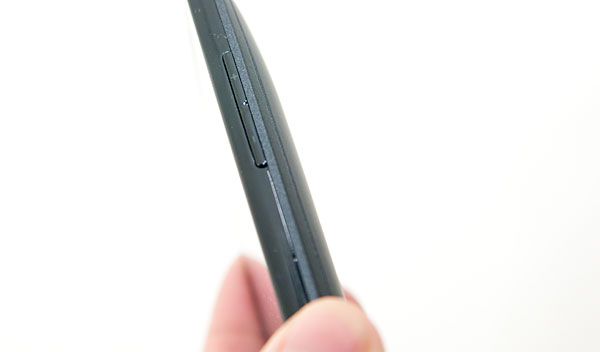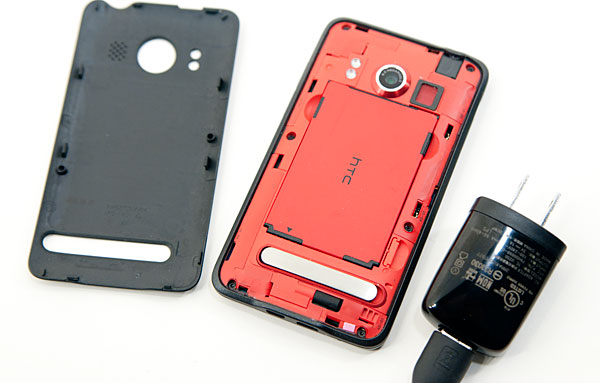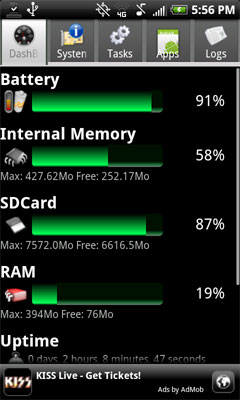The Sprint HTC EVO 4G Review
by Anand Lal Shimpi on June 28, 2010 6:04 PM ESTDeath to Physical Buttons
Along the top of the EVO 4G, just to the right of center is a power/lock button. It barely protrudes from the chassis which makes it difficult to hit both on accident and on purpose. On the right side of the phone is a volume rocker switch, which squeaked on my review sample. Those three are the only physical buttons on the device. The EVO 4G is all about its screen and HTC did nothing to detract from that.

The line of capacitive touch buttons along the bottom of the screen are responsive and by default have haptic feedback enabled (the phone vibrates slightly when you hit one of them). Unlike the Incredible I reviewed, the back of the phone didn’t rattle whenever the phone vibrated.

The touch buttons themselves are just as responsive as on the Incredible, which also means they are much better than those on the Nexus One.
The EVO 4G feels pretty solid. The front is nearly all screen (minus the row of touch buttons at the bottom), the border of the phone is glossy black plastic and the back is a very soft feeling plastic that’s wonderful to pet. The device doesn’t feel fragile.
Since there’s very little border around the screen and buttons I found myself accidentally triggering the quick search and sometimes the camera app with my palm while holding the phone.
Getting the back cover off is simple enough: just stick your finger nail in the opening at the top and pull it off. It snaps back on just as easily. I found that in general the EVO 4G seemed to be better built than the Incredible but not quite as solid as the Nexus One.

Beneath the rear cover you’ve got the now typical HTC arrangement. A beefy 5.5Whr battery and a microSD card slot for media (and eventually app) storage. The phone ships with a 8GB microSD card by default.
Along the bottom of the phone you’ve got a micro USB connector and a mini HDMI connector. The latter can only be used while playing back videos; it won’t mirror the EVO’s display to your TV unfortunately.

The phone comes with a USB cable and USB power adapter. The HDMI cable is sold separately.
Let’s Get Chippy
Inside the HTC EVO 4G is a Qualcomm Snapdragon QSD8650 SoC. This, unlike the Snapdragon in the Nexus One, supports both GSM and CDMA networks, which is what lets this phone work on Sprint.
The Snapdragon SoC has an amazing amount of integration that brings the CPU, GPU, video encoder, decoder, camera processor and modem all onto a single piece of silicon. To enable WiMAX support HTC turned to Sequans and used its SQN1210 WiMAX radio; this is what gives the EVO its 4G network support.

The 4G radio has an easily accessible on/off widget on one of the home screens by default, but honestly the Sequans chip appears to do a good job of being power efficient. I didn’t see a substantial difference in battery life with 4G enabled or disabled as long as the workload remained the same. Obviously with a faster connection you’re more likely to surf and download more, which will in turn kill your battery quicker but from what I’ve seen 4G battery life is roughly the same as 3G battery life for an identical workload (more on this later).
A Broadcom BCM4329 controller enables 802.11n support as well as Bluetooth and FM Radio tuning. Yes, the HTC EVO 4G can function as a high priced alarm clock radio if you want it to.










97 Comments
View All Comments
thesafetyisoff - Thursday, July 1, 2010 - link
This article needs to be re-written after the system fix for the Evo that occurred yesterday. The over-the-air system update released on June 30, 2010 fixes the battery life issue. Really.After buying my Evo, I initially had the same problem with battery life: Even using task killer aps, the phone would drain at least 15-20% of battery power EVERY HOUR. I'd plug it in overnight and it was half dead by the time I got to my office, completely dead by lunch time. I had to get an extra charging cable for the car and the office, and it would still run out of juice if I had to be in a meeting for an extended time. And forget about airline trips entirely. To make matters worse, my phone started hanging up and spontaneously rebooting, so I couldn't even use it when it had battery life. I was about to return it when I heard that a system upgrade was pending.
The update fixed EVERYTHING. No hang-ups, no reboots, and a full charge went over 14 hours with moderate use. I don't know why htc initially shipped the phones without this fix, but the problem is now gone.
Long live the Evo - on a single charge!
worldbfree4me - Thursday, July 1, 2010 - link
Great to see a non-biased and impartial article! However, I do wonder that if this review would have been done post Sprint update, would the results have been slightly better with regards to the battery test. Battery life for me personally has not been a problem for me due to me having a charger at the Office, in the Car, at Home and a Battery pack that is used when traveling that can power 2 USB devices. Also, it is a well known fact that the Stock Android UI weighs less than the HTC Sense UI. This could be why the N1 is consistently faster then the Incredible and the EVO. I suspect FROZEN YOGURT aka 2.2 should close this gap somewhat. Overall, I feel that each of the aforementioned phones is very close in terms of overall performance.rf40928 - Friday, July 2, 2010 - link
Maybe the review for the iPhone 4 wasn't complete yet..but its funny how the Iphone 4 review that Anand did proves
Iphone 4 on a "slower" 3g network is consistantly faster then the Droid on a 4G network when it comes to the web .. I guess 4G's Peak performance is theoretically better.. but are Sprints 4G average 4g Speed numbers better then ATT's avg 3g speeds??
it would seem not..
topgun966 - Saturday, July 3, 2010 - link
I noticed you said that there is a 5gb cap on 3g. That's incorrect with the Evo. Evo plan has a $10 premium which nulls that cap. The Evo is true unlimited both 3g and 4g. Great review otherwise.OzzieGT - Friday, July 9, 2010 - link
Thanks for the honest and detailed review. It's because of this review I feel better about waiting for the Samsung Epic. A little smaller, also a good screen and the Swype keyboard are making for a very interesting package...VIDYA - Monday, July 12, 2010 - link
Samsung and nokia will remain in the future with the mature platforms and technology while the USA based companies will be eager to run and fall down before learning to walk or simply take stride....... 4G by HTC and SPRINT is a joke or a watered down format war.Announcer - Saturday, October 9, 2010 - link
My business partner and I travel between Dallas/Fort Worth and the SF bay area. I have the Sprint HTC Evo and he had the At&t Iphone 4g, The Evo 4G blows away the Iphone in the Dallas metroplex area and holds its own in the SF bay area. When I am in the Dallas tethered to my Evo with my laptop I get 6 Mbps and just surfing with the Evo everything loads faster than the Iphone on At&t. Sprint 4G rules! I did have At&t a few years ago and the customer service was horrific. I got a sprint air card and was grandfathered in on the unlimited usage. I did have a At&T HTC Tilt phone and tethered it to my laptop. The speeds on At&t were abysmal then I got the sprint aircard and went from 400kbps with At&t to 1700 kbps with sprint. Needless to say my partner paid off his At&t contract, sold his Iphone and now has a Sprint Evo 4G.